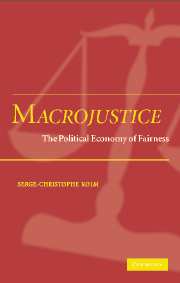Book contents
- Frontmatter
- Contents
- Presentation
- PART ONE BASES: CONSENSUS, FREEDOMS, AND CAPACITIES
- 1 Macrojustice: An overview of its place, method, structure, and result
- 2 Social freedom
- 3 The liberal theory
- 4 Free and equal in rights
- 5 Resources
- 6 Capacities
- PART TWO OVERALL DISTRIBUTIVE JUSTICE: ELIE (EQUAL LABOUR INCOME EQUALIZATION)
- PART THREE COMPARISONS WITH POLICIES AND PHILOSOPHIES
- PART FOUR THE DEGREE OF COMMUNITY, EQUALITY, RECIPROCITY, AND SOLIDARITY
- PART FIVE COMPARISON WITH ECONOMICS' SOCIAL ETHICS
- References and bibliography
- Index
4 - Free and equal in rights
Published online by Cambridge University Press: 31 July 2009
- Frontmatter
- Contents
- Presentation
- PART ONE BASES: CONSENSUS, FREEDOMS, AND CAPACITIES
- 1 Macrojustice: An overview of its place, method, structure, and result
- 2 Social freedom
- 3 The liberal theory
- 4 Free and equal in rights
- 5 Resources
- 6 Capacities
- PART TWO OVERALL DISTRIBUTIVE JUSTICE: ELIE (EQUAL LABOUR INCOME EQUALIZATION)
- PART THREE COMPARISONS WITH POLICIES AND PHILOSOPHIES
- PART FOUR THE DEGREE OF COMMUNITY, EQUALITY, RECIPROCITY, AND SOLIDARITY
- PART FIVE COMPARISON WITH ECONOMICS' SOCIAL ETHICS
- References and bibliography
- Index
Summary
CLASSICAL BASIC RIGHTS AND FULL PROCESS-FREEDOM
“Men are free and equal in rights.” The rights in which men are so declared equal are the classical basic rights, or simply basic rights, or basic freedoms. They constitute the legal and social ethical basis of modern democratic societies (although the term “democracy” does not refer to their main part, the “rights of man,”but only to their political part, the “rights of the citizen”). They constitute the base, core, and fountainhead of their constitutions – they are commonly presented as their preamble. Hence, they constitute, in these societies, the most basic and general rule of the law, its prime source, and the most basic and general rule of the relations between persons and between them and institutions. This does not prevent a number of violations of these rights, strictly understood, by lawful rules in these societies. We will notably find examples of this fact in fiscal systems, and we will also see that these violations are not necessary for their very purposes – such as realizing a just redistribution. We will also see, moreover, that these violations also reveal an imperfect application of the political basic rights because they induce inefficiencies in Pareto's sense, hence a lack of respect for the principle of unanimity, whereas this principle is implied by the democratic participation required by these rights.
- Type
- Chapter
- Information
- MacrojusticeThe Political Economy of Fairness, pp. 70 - 81Publisher: Cambridge University PressPrint publication year: 2004



